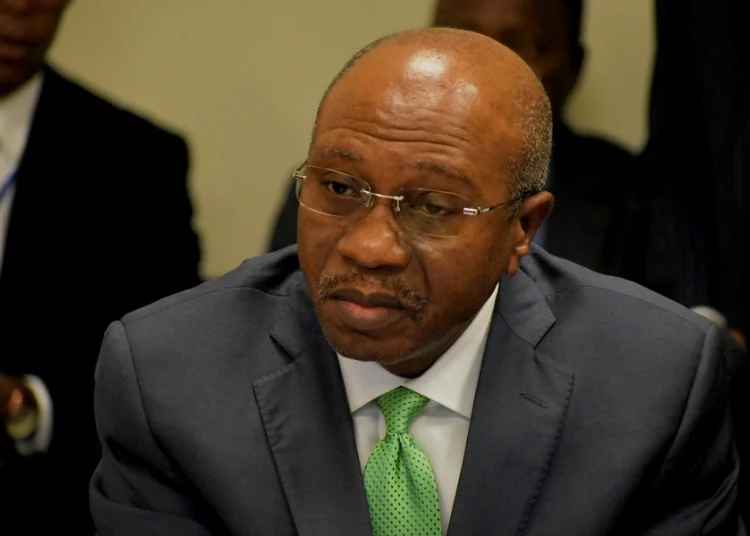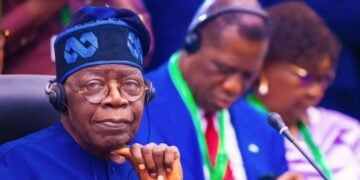The Central Bank of Nigeria (CBN) has insisted it followed the law and due process to carry out the process of redesigning three series of the Naira, which is 12 years due.
This clarification came on the heels of claims by the minister of finance, budget and national planning, Zainab Ahmed, that her ministry was not consulted by the apex bank.
And in response to the recently announced policy, the Organised Private Sector(OPS) has opposed the CBN’ move to redesign the Naira notes, hence, calling for innovative policies, even as some Nigerian banks have commenced Saturday banking as part of compliance measures to the CBN’s new rules on deposit.
Speaking with a group of newsmen in Abuja, on Friday night, the spokesman of the CBN, Mr. Osita Nwanisobi, expressed surprise at the minister’s claim, stressing that the CBN remains a very thorough institution that follows due process in its policy actions.
According to Nwanisobi, the management of the CBN, in line with provisions of section 2(b), section 18(a), and section 19(a)(b) of the CBN Act 2007, had duly sought and obtained the approval of President Muhammadu Buhari in writing to redesign, produce, release and circulate new series of N200, N500, and N1,000 banknotes.
However, urging Nigerians to support the currency redesign project, he said it was in the overall interest of Nigerians, reiterating that some persons were hoarding significant sums of banknotes outside the vaults of commercial banks. This trend, he said, should not be encouraged by anyone who means well for the country.
Furthermore, he noted that currency management in the country had faced several escalating challenges which threatened the integrity of the currency, the CBN, and the country, adding that every top-rate Central Bank was committed to safeguarding the integrity of the local legal tender, the efficiency of its supply, as well as its efficacy in the conduct of monetary policy.
On the timing of the redesign project, Nwanisobi explained that the CBN had even tarried for too long considering that it had to wait 20 years to carry out a redesign, whereas the standard practice globally was for central banks to redesign, produce and circulate new local legal tender every five to eight years. While assuring Nigerians that the currency redesign exercise was purely a central banking exercise and not targeted at any group, the CBN spokesman expressed optimism that the effort will, among other goals, deepen Nigeria’s push to entrench a cashless economy in the face of increased minting of the eNaira. This, he said, is in addition to helping to curb the incidents of terrorism and kidnapping due to access of persons to the large volume of money outside the banking system used as a source of funds for ransom payments.
Nwanisobi therefore urged Nigerians, irrespective of their status, to support the Naira redesign project, as it is for the greater good of the economy.
Accordingly, the CBN had directed all banks to keep open, their currency processing centers from Monday to Saturday so as to accommodate all cash that will be returned by their customers.
Consequently, one of Nigeria’s tier two banks opened for business on Saturday, calling customers to come and deposit their cash.
“I received a call from my account officer telling me that I can come and deposit my money today (Saturday)”, a trader who deals in wholesale foodstuff said in Lagos market.
On Friday, banks issued notification to their customers on the need to begin to deposit old banknotes in the branches close to them.
“In line with this directive, you are advised to deposit all old banknotes to the bank latest 31st Jan 2023. The new banknotes will be in circulation effective December 15, 2022 and can be accessed in any Fidelity Bank branch. Kindly note that the new and existing currencies will remain legal tender and circulate together until January 31, 2023 when the existing currency shall cease to be legal tender,” Fidelity Bank said in a notice to their customers.
Also, Access Bank on Friday issued an update to its customers, saying, “Dear valued customer, this is to inform you that the Central Bank of Nigeria will issue a new series of naira notes beginning December 15, 2022. Beat the rush; visit an Access bank location now to deposit your cash.”
However, the Lagos Chamber of Commerce and Industry (LCCI) through its director-general, Dr. Chinyere Almona noted that, “replacing old currency notes with new ones is a routine exercise that central banks do not necessarily make noise about. Old notes are gradually replaced with new ones once they return to the banking system. Proposing a sudden withdrawal of notes for replacement with redesigned notes is of no economic benefit to the country, but it will come at huge costs.”
According to her, “redesigning the N100 to N1000 notes, which should not be a priority now, is a waste of the nation’s time and resources. The N100 (equivalent to US 20 cents) to N500 (equivalent to $1) are due for replacement with naira coins of the same denominations to make room for the introduction of higher denominations of naira notes that will be more in line with the value of denominations of currency notes circulating in other climes.
“Fixing the deadline two to three weeks ahead of Christmas/New Year festivities, two months ahead of the general election, is disruptive and insensitive. The organized private sector is already enduring a lot of disruptions ranging from local forex supply, exchange rate, and interest rate shocks. These aggravate food and energy shocks, and they deserve to be spared the needless disruption from the wild goose chase proposed by CBN so close to the yuletide and the polls.”
Almona pointed out that “the CBN is proposing to redesign and replace five billion pieces of the highest four denomination notes, when the appropriate action to take is to coin N100 to N500 notes and replace them with about a billion pieces of larger denomination Naira notes to cut the monumental waste implicit in continuing to print pieces of low-value notes with a short lifespan.
“The naira will likely experience more exchange pressures that may further weaken it against major currencies if more people decide to buy foreign currencies as alternative store of value. The CBN needs to be more innovative to establish appropriate policies and take actions that will drive down the inflation rate and strengthen the value of our Naira.”
Similarly, the director-general of the National Association of Chambers of Commerce, Industry, Mines and Agriculture (NACCIMA), Mr Olusola Obadimu commended the CBN for this development aimed at controlling the quantum of Naira in circulation, noting that, “this will certainly take some money to implement, but we believe the necessary resources have been expended on good cause.”
He added that, “it is necessary to de-emphasise elections generally. This culture of finishing an election and for everyone to start preparing for the next one in four years’ time rather than focusing on governance for development should be discouraged. We are spending too much energy and resources on elections as it is.”
He stated further that, “the money being concentrated on electoral processes could be better expended on rebuilding infrastructure which, unfortunately, gets progressively weakened by the day. Also, a reasonable sense of insecurity still persists. Therefore, political leadership at all governmental levels should prioritise these matters as these are the issues that add basically to the cost of doing business and, ultimately, contribute to rising cost-push inflation.”
Any Cosmetics Measure Will Not Stop Kidnapping – Sheikh Gumi
Kaduna based Islamic cleric, Sheikh Ahmad Gumi, on Saturday, said one of the reasons given for redesigning naira, which is to starve kidnappers of naira will not work as the criminals will resort to dollars and other hard currencies.
Gumi warned that Central Bank of Nigeria (CBN)’s redesigning of naira will further put more pressure on the economy making the rotten situation worst.
Gumi who posted this on his verified Facebook page, while reacting to CBN’s redesigning of naira said what the country needs is a free market driven economy with minimal cash flow control.
Voided Naira Notes: Kidnappers Will Resort To Dollars, Other Hard Currencies – Sheikh Gumi
The cleric noted that eight percent of Nigerians, especially rural people depend on cash transactions, which a sudden change to a cashless or cash-starved society will mean pauperizing them in a short period of time that could trigger an unprecedented socio-economic turmoil ”on this semi-skilled or unskilled population”
Gumi wrote: “As for the question of starving kidnappers of Naira, it goes without saying that they will resort to Dollars and other hard currencies which will further put more pressure on it making the rotten situation bad-der.
“What we need is a free market-driven economy with minimal cash flow control.
As for the question of starving kidnappers of Naira, it goes without saying that they will resort to Dollars and other hard currencies which will further put more pressure on it making the rotten situation bad-der. Kidnapping can only be stopped by robust policing, social justice for all, and equitable wealth distribution. Any cosmetic measures will not stop it”
“Changing the Naira: This is no time for economic kamikaze! People that sell goods will tell you that most Nigerians don’t have the money to buy things; therefore most traders are running at a loss and are already folding up. At this junction, anything that can cause more cash crunch will be a disaster for the nation”
Gumi stressed:”Many good ideas are marred by wrong timing. This is likely to be another one. No matter how ingenious the hatchers may romanticize; the benefit will remain phantom since the reality on the ground is incongruous and it spells doom for the escapade.
“This kind of program is not for a government that is in the throes of its demise. If there is any advantage of such adventures, it usually comes after many years of excruciating poverty and hardship which no well-meaning government should hand over such cruelty to another incoming government to manage”
He added:”Had it been started in 2015, it could be logical since the same government will bear the consequence of its action.
We are a witness when the banning of motorcycles, sell of petrol and the blockage of communication in banditry-infested states did not help to curb the menace but rather made the populace suffer the more. This clearly shows that the government doesn’t consider the pros and cons of its activities which are largely haphazard, not well thought through, and worst still clumsily executed”
Gumi continued:”Mopping the cash from the populace as it claims to swell commercial banks will give an unfair advantage to a few people that control the banks against the greater population. As for the North which is poorly represented in the banking system, it’s a sure economic suicide. How many Nigerians have access to banks? How many do have the privilege to enjoy the most simple of banking loans? You need to know someone to get a loan is no news. In such a Nigeria, with this tight control of cash flow, the nation is treading towards communism and dictatorship.
May Allah open our eyes and prevent us from jumping from frying pan to fire. Amin” he warned.





